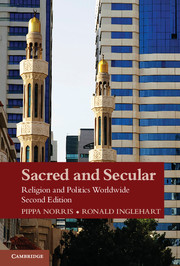Appendix C
Published online by Cambridge University Press: 05 June 2012
Summary
Technical Note on the Freedom of Religion Scale
The new Freedom of Religion scale was developed based on the following twenty criteria. Countries were coded from information contained in the U.S. State Department report on International Religious Freedom, 2002. The report is available online at: http://www.state.gov/g/drl/rls/irf/. Each criterion was coded 0/1 and the total scale was standardized to 100 points, ranging from low to high religious freedom. The scale represents an expanded version of the 1992 Chaves and Cann scale used to measure state regulation in eighteen postindustrial societies.
The constitution limits freedom of religion.
The constitution does not recognize freedom of religion. (Or the law does not recognize freedom of religion, in countries without a written constitution.)
A single official (established) state church exists.
The state favors one religion.
Religious organizations must register with the state or be designated by it to operate legally, or the government imposes restrictions on those organizations not registered or recognized.
The state issues legal permits for religious buildings.
The state appoints or approves church leaders, church leaders appoint or approve government officials, and/or church leaders have specific positions in the government.
The state pays church salaries directly.
The state subsidizes some/all churches.
The state provides tax exemptions for some/all churches.
The state bans clergy from all or some specified religions from holding public office.
The state owns some church property and buildings.
The state mandates some religious education in state schools, even though students can be exempted from this requirement with a parent's request.
There are reports of forced religious conversions.
The state restricts some denominations, cults, or sects.
The state restricts/bans some missionaries entering the country for proselytizing purposes.
The state restricts/censors some religious literature entering the country or being distributed.
The state imprisons or detains some religious groups or individuals.
The state fails to deter serious incidents of ethno-religious conflict and violence directed against some minority groups.
The state is designated a country of particular concern for freedom of religion by the U.S. State Department.
- Type
- Chapter
- Information
- Sacred and SecularReligion and Politics Worldwide, pp. 293 - 294Publisher: Cambridge University PressPrint publication year: 2011

